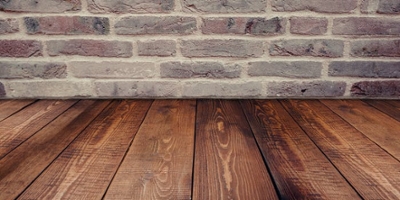I go to college in my hometown, and live with my folks to save money. Now that I’m a junior, they’re leaving me in charge of the house. They bought an Airstream trailer and took off to New Jersey a few weeks ago. However, the house is pretty old, and I’m starting to notice that the floors in the kitchen are tilting badly enough that it’s noticeable. It’s weird because the house sits right on the ground, and we don’t have a basement. Winters here are pretty bad (I live in Illinois), so I’m worried that when it gets colder (and wetter), we’re going to be in serious trouble. Still, I wonder if I’m ready to take on a project like this. What should I do to fix the issue? Who should I call?
How do you keep things stable? For a lot of students, this is a question of juggling a job and schoolwork, or maybe a long-distance relationship on top of college friends and social commitments. You, on the other hand, have an especially challenging task: school and homeownership. The fact that you’ve noticed the sagging floor problem shows that you are probably ready to take care of a home. A lot of students, busy as they are, might brush it off, ignore it, or not notice in the first place. Furthermore, the main hitches for most new homeowners are financial, and you, fortunately, don’t have that burden yet. You seem mature, so you can put your fears of being unready to rest.
What to do, then, about that caving kitchen floor? As home foundation repair specialists point, there are several different scenarios that could be causing your problems, most of which involve a sinking foundation. Winters in the upper midwest are pretty rough, so most of the damage to your foundation is a product of the freeze-thaw cycle. When the soil underneath your house freezes in the winter, it expands, and when it thaws, it contracts. As this cycle continues, your house literally sinks deeper and deeper into the ground. Depending on the composition of the soil underneath your house, one side might settle more than the other. Furthermore, concrete (which comprises the foundation of most houses) is slightly porous. Old foundations have seen decades of freeze-thaw cycles, so the concrete underneath your kitchen floor could be crumbling, cracking, or compressing, and therefore sinking.
Your first step should be to call your parents and notify them of what is going on. It is admirable that you want to fix the problem, but it is, after all, their house. Once you get the OK to move forward with repairs, you can call up a few foundation repair contractors to check your house’s foundation. A contractor will come to your house for free to give you an estimate of the repair costs. Calling up a few contractors also gives you the opportunity to shop around for the best deal and to get an idea of what the essential repairs are.
Keep in mind that a foundation repair contractor fixing your sinking basement is going to be much more expensive than a plumber repairing your leaky pipe. Stabilizing a foundation involves driving steel piers beneath the house down to the bedrock, in order to lift the house’s sinking corner. According to Homeadvisor, the average cost is about $4,000. While you probably don’t need your parents around for the initial assessment, you will probably want them there once work begins, and definitely want them there for when the bills come through. If all goes well, you won’t have to worry about expecting a call from New Jersey attorneys working on behalf of your parents to reclaim unnecessary funds spent from their account.
Content Provided by Scholarship Media


